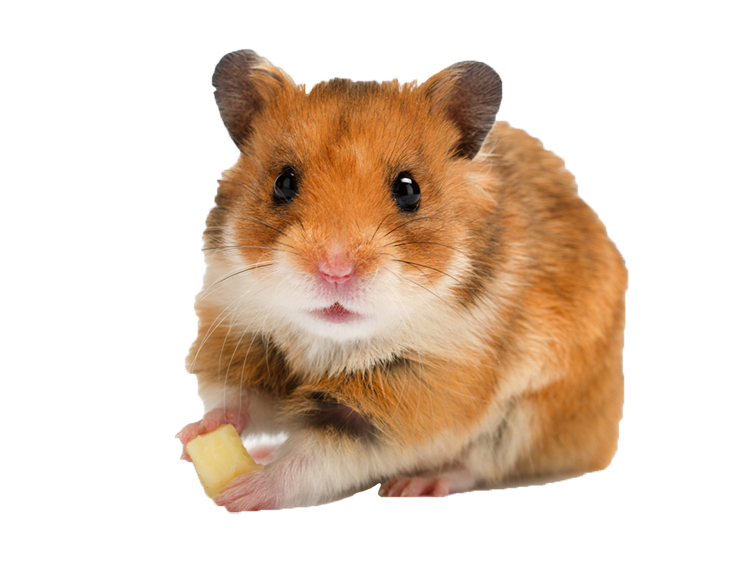All hamsters should be examined
ANNUALLY.
by a veterinarian. Please monitor your pet and call us if you have any concerns. Some signs include: eating less or not eating at all, defecating less or not passing feces at all, and appearing uncomfortable, hunched, or quieter than normal.

Some of the most important pieces of making sure your hamster is well taken care of include:
Good quality hamster pellet diet
Small amounts of fruits and vegetables
House hamsters individually
Large cage with nesting material and bedding
Hamster balls, wheels, and tunnels
Hamster Care Instructions
In general, we recommend the following diet for hamsters:
- Good quality hamster pellets (e.g. Oxbow) or rodent chow with a minimum of 24% protein.
- Vegetables and fruits can supplement their diet and can be offered in very small amounts. No more than 1/4 teaspoon per day. Treats high in sugar, such as yogurt treats are not recommended and should be given sparingly.
- Small amounts of grass hay, such as oat, timothy, orchard, or meadow hay can be offered daily. Oxbow is a great brand.
- The mixes of cereal, fruits, seeds, and grains, usually sold as “hamster food” at the pet store, are NOT recommended as they do not provide a balanced diet and predispose to obesity, dental problems, and vitamin E deficiency.
- Hamsters are nocturnal. They instinctively burrow and hoard their food and can be fiercely territorial. Therefore, it is always best to house hamsters individually to avoid fights and trauma.
- Hamsters are best housed at room temperature around 68-75°F with 40-60% humidity. They can enter a state of torpor if temperatures fall below 41°F, especially during the winter. Using a humidifier near their enclosure can help a healthy respiratory track.
- Hamsters have large cheek pouches to store their food, which when full can extend over their backs and shoulders.
- Hamster balls are a fun way for your pet to safely explore a room. Always supervise them while they are outside of their home as stairs or other large predators (cats/dogs/birds) can be present in the home and cause them harm.
- Provide the largest cage possible made of stainless steel, durable plastic, or wire mesh small enough that does not allow escape.
- Provide ample nesting material and a deep layer of bedding material that is paper based and absorbent such as Care Fresh. A full cage cleaning should be done once weekly to remove soiled bedding. AVOID pine, cedar, and aspen bedding.
- Rodents have very sensitive respiratory tracks. Candles, incense, aerosol products, scented products, aromatic diffusers/essential oils, or heavily scented cleaning products should not be used near or around them! When cleaning and disinfecting their enclosure and food bowls, ensure it’s well rinsed off with water and air dried before replacing your pet back into its home.
- Provide enrichment in the form of tunnels, solid plastic exercise wheels, nest boxes, and paper items to chew on such as toilet paper tubes and paper towel rolls.
- Clean, change, and check to make sure the water bottles are functioning frequently.


